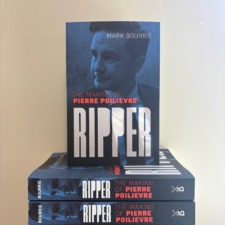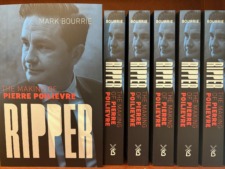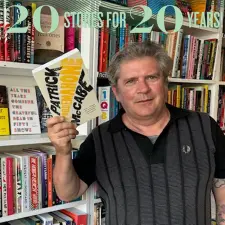The Bibliophile: Scathing, surgical, and colourfully entertaining
Want to get new excerpts, musings, and more from The Bibliophile right away? Sign up for our weekly online newsletter here!
***
Mark Bourrie’s Ripper: The Making of Pierre Poilievre has quickly become a national bestseller; this week, it sits at #3 on the Canadian Nonfiction list. Despite initial worry that the election call would hinder the media’s ability or willingness to cover a critical biography of the Opposition leader, it’s great to see Bourrie’s hard work pay off. And we’re especially grateful for all the journalists who are showing up to write thoughtful, non-partisan coverage during this increasingly terrifying period. We’re also grateful to the people who are taking the time to read books like Ripper ahead of election day (or any day): we all have to stay vigilant.
Dominique Béchard,
Publicist
***
Ripper: Ottawa Launch
The Walrus
“Poilievre is a pro-American libertarian who moralizes the sufferings of the marginalized, insists the free market has inherent genius, drives wedges between the regions of the country, and exploits class envy. By the early winter of 2025, the political gears of the country changed. The political fight in Canada quickly became about who was best to face the external threat and whose ideas were best to help Canadian families and businesses at a time of real danger. On April 28, we’ll know if his brand of politics will survive the very crisis it claimed to prepare for.”
—Mark Bourrie, excerpted from Ripper
Globe and Mail
“Mark Bourrie has produced a searing but convincing critique of the Conservative Leader’s shortcomings that will give pause to anyone outside the diehard Poilievre base.”
—Charlotte Gray
“In his pull-no-punches book, Mr. Bourrie portrays Mr. Poilievre as one serious ripper: mean, sneering, insulting, truth-evading, skilled at whipping up mass anger.”
—Marsha Lederman
“If Pierre Poilievre is going to win, shake [the comparison to Trump] he must. This book, with all its pungent reminders of his record, will make it harder to do.”
—Lawrence Martin
“‘It’s an intense subject, the future of Canada—there isn’t anything more important than that, and at a time of revolution, which I think we are in,’ [Bourrie] says . . . The story was there; he just needed to collate the pieces.”
—Josh O’Kane

Photo: Ripper: The Making of Pierre Poilievre by Mark Bourrie. Cover designed by Ingrid Paulson.
Toronto Star
Bestsellers Lists: #3 on the Canadian Nonfiction list, and #7 on the Original Nonfiction list.
Interview with Mark Bourrie and Stephen Maher, excerpted:
Stephen Maher: One of the pleasures of your book is the attention it pays to the social and economic forces Poilievre has harnessed. You argue persuasively that Trudeau let Poilievre become a champion for the working class by neglecting their concerns and failing to communicate. But every incumbent government around the world had a similar crisis. Was it really Trudeau’s failure, or was it just that the situation created an opening for a person such as Poilievre?
Mark Bourrie: I think it’s a systemic failure among centrists, people on the left and even the union movement to maintain a good, strong relationship with shop floors. And we saw that folks realized there was this great big working-class vote out there that wasn’t being tended to. And the Liberals, after the first year of COVID, could not communicate with anybody. They were just so disconnected. Canadian conservatives went to the United States and learned this stuff, but it was also something that former British Prime Minister Boris Johnson was able to pick up on. It’s something that the Brexiteers were able to pick up on, as well as the AFD in Germany.
Winnipeg Free Press
“Despite [the rush to print], the work never seems rushed. It is lengthy and historically detailed while relying on media, secondary sources and parliamentary debates.”
—Christopher Adams
The Tyee
“This book is a phenomenal effort, carefully researched and nicely written. Ripper should be widely read by everyone who cares about the value of casting an informed vote on April 28.”
—Michael Harris
Hill Times
“Every Liberal in their war room, every journalist covering the campaign and—should he win—every stakeholder doing business with an eventual Poilievre government owes it to themselves to read Bourrie’s Ripper so that they can have a clear picture of who Poilievre is, how he came to be, and how that past is almost certain to shape his decision-making going forward.”
—Jamie Carroll
CBC Windsor Morning
Cult MTL
“The page-turner is crack for political junkies.”
—Toula Drimonis
NB Media Co-op
“Mark Bourrie’s new book is a detailed and surgical examination of the man who could be Canada’s next prime minister.”
—Gerry McAlister
UnHerd
“In a scathing but comprehensive recent biography, Ripper: The Making of Pierre Poilievre, the historian Mark Bourrie points out that his [Poilievre’s] thinking on most subjects has not advanced much since adolescence.”
—Michael Ledger-Lomas
Canuckleheads Podcast
That Shakespearean Rag
“By positioning Poilievre in the context of the global social and economic cleavages that permitted him him to attain power, Bourrie transcends a simple biography and creates a snapshot of our riven historical moment, one that should prove illuminating for anyone looking around in abject confusion and wondering how we got to this particular point.”
—Steven W. Beattie
Ken McGoogan
“Ripper has no business being so detailed and wide-ranging, so authoritative and convincing, so brilliantly analytical and colourfully entertaining.”
On Substack:
“Bourrie writes an honest and comprehensive account of Poilievre’s and offers a look at where he might take the country. The book is no hagiography, but nor is it a hatchet job (a lesser author might have been less disciplined). It’s a fitting, if disconcerting, election primer.”
—David Moscrop
“His [Mark Bourrie’s] latest book RIPPER isn’t just a biography—it’s a field guide to fascism wrapped in a Canadian flag soaked in Axe body spray.”
—Dean Blundell
“[Ripper] is far from a hatchet job. Bourrie appreciates Poilievre’s cunning and instinct for the jugular—he just doesn’t like him too much.”
—Ethan Phillips, Oversight
“Bourrie’s critical of Poilievre . . . But he reflects on Poilievre’s strengths and weaknesses, informed by close observation of the Conservative leader’s entire career.”
—Paul Wells
“Bourrie’s style is accessible, the prose is clear and sparse . . . Bourrie’s dry wit brings a chuckle now and then.”
—Margaret Shkimba
“[E]xcellent instant bestseller.”
—Rose Simpson, Rose’s Cantina











